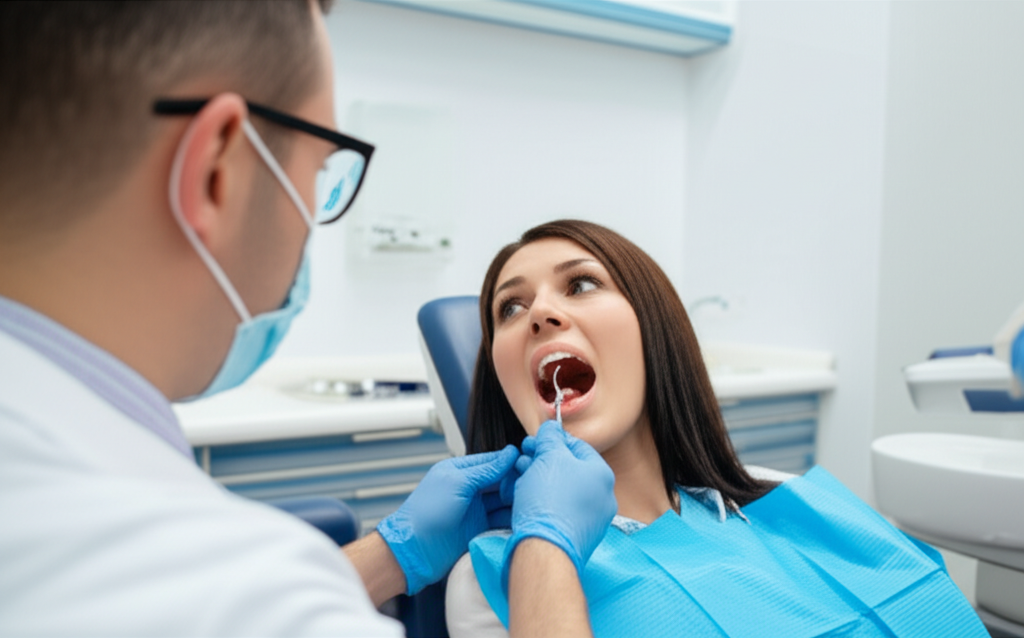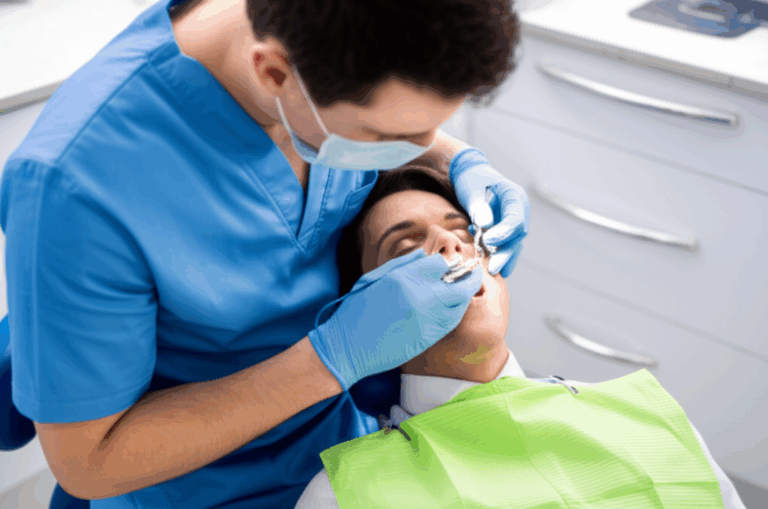
Can a Dentist Give You Antibiotics? My Experience, What I Learned, and What You Need to Know
Table of Contents
- Acute Dental Infections With Systemic Involvement
- Prophylactic Antibiotics: Prevention in Special Cases
- Post-Surgical Infections: The Real Story
- When Antibiotics Are NOT The Answer
Introduction: My Journey With Dental Prescriptions
Not too long ago, I sat in a dentist’s chair with my face hurting and cheeks puffed up. I had a really painful tooth infection that ruined my week, and all I wanted was for the pain to stop. As I waited for the dentist, tons of things ran through my head. Can a dentist give out antibiotics? Do I need them? Am I about to get some pills, or will they need to do something else?
After years of going to the dentist—sometimes for myself, sometimes with family and friends—I’ve seen it all. I’ve been given prescriptions, told “no antibiotics for you,” and learned a few things from both sides of the dental light. “Can a dentist give you antibiotics?” People ask this a lot more than you’d think. My goal is to tell you everything I wish I knew at the start, so next time you have a toothache, you’ll know what might happen.
When Are Antibiotics Necessary? What I’ve Seen Firsthand
After my own experience, and talking to dentists about how they decide this, I learned that it’s not as simple as yes or no. Dentists can give you antibiotics, but they don’t do it every time. Here are four times I’ve dealt with or learned about.
Acute Dental Infections With Systemic Involvement
Here are times you’re most likely to leave with a prescription.
Dental Abscesses
Once, my friend called me, super worried, with a big, swollen cheek. She told the dentist she had swelling, pus, and a fever. The dentist said it was probably a dental abscess, which is a deep tooth or gum infection. Amoxicillin, or clindamycin if you’re allergic, are the go-to meds.
Cellulitis
My dad once had redness and swelling in his jaw that got worse quickly. The dentist said he had cellulitis, a spreading infection you really don’t want to ignore. This is a classic case for antibiotics, to keep the infection from moving to other parts.
Pericoronitis
My old roommate had wisdom tooth pain that just wouldn’t stop. His gums got swollen and he had a fever, and the dentist said it was pericoronitis—basically, infection under gum flaps near a partly out tooth. Antibiotics are used here too, especially if there’s swelling, fever, or trouble swallowing.
Prophylactic Antibiotics: Prevention in Special Cases
Not every prescription is to stop a big infection. Sometimes, they’re just to keep high-risk people safe.
Heart Conditions and Joint Replacements
After my aunt had surgery on her heart valve, her dentist always checked with her doctor before even cleaning her teeth. Some people are more at risk for something called endocarditis (an infection inside the heart) after dental work, so they might get antibiotics before even simple visits. Some people with new joint parts may get this too, but it’s not as common now and doctors are careful about when to give it.
Immunocompromised Patients
I’ve seen friends who are going through cancer treatment get antibiotics before dental work to protect their weaker immune systems from getting sick.
Post-Surgical Infections: The Real Story
A lot of people think you always need antibiotics after getting a tooth pulled or a root canal. That’s really not true in my experience. Dentists usually only give them if they see signs of infection, if you’re at high risk, or if the surgery was tough.
I had a wisdom tooth out and asked my dentist if I should take antibiotics just to be safe. He shook his head and said, “You’re healthy and nothing is infected. You don’t need them, and taking them when you don’t have to can actually be bad for you.”
When Antibiotics Are NOT The Answer
This is something I learned the hard way. I used to ask for antibiotics every time my tooth hurt, thinking it would fix things quickly. I was wrong, and my dentists were right.
Sometimes you just don’t need antibiotics:
- Pain or a swollen spot that isn’t spreading
- Tooth nerve pain (irreversible pulpitis) without fever or other problems
- Chronic abscesses that actually need dental work like a root canal
- Basic toothaches or mouth sores from a virus
Antibiotics can’t fix nerve pain, and they won’t heal chronic abscesses—you need real dental care for that. Taking a pill might help a bit, but it won’t actually cure the problem.
The Common Types of Dental Antibiotics (And My Encounters With Them)
You might wonder what drugs dentists actually use. I’ve had a bunch, and each has a certain job.
Penicillin-based Options
My first prescription was amoxicillin. Dentists like this one because it works well, is safe for most people, and targets usual mouth germs. Penicillin V is pretty close—used for regular infections too.
Alternatives for Penicillin Allergies
If you’re allergic to penicillin, I’ve seen friends get clindamycin, azithromycin, or metronidazole. They fight other bacteria in your mouth.
For really tough, deep infections that need to fight germs under the gums where there’s no air, dentists may put amoxicillin or penicillin together with metronidazole.
Others I’ve Come Across
Sometimes for gum disease, dentists might give doxycycline. It is often used with special cleanings for hard-to-treat gum infections.
The Rising Importance of Antibiotic Stewardship in Dentistry
After I went through a few rounds of antibiotics that didn’t really help (plus a week with a really bad upset stomach), I realized taking too many antibiotics is a problem. Antibiotic stewardship—the idea of only giving them when someone truly needs them—matters more now than ever.
Understanding Antibiotic Resistance
I used to think antibiotic-resistant “superbugs” were someone else’s problem. Then, someone in my family got an infection that regular medicine couldn’t fix. Suddenly it was real. If we keep using antibiotics for every little ache or when we don’t really need them, we help create germs that might not go away with today’s medicine.
The Dentist’s Responsibility
From what I’ve seen, the best dentists always explain why they are, or aren’t, giving you antibiotics. They talk about guides from the American Dental Association and make sure I know what could go wrong.
The Patient’s Role
It’s up to us too. If your dentist gives you antibiotics, finish the whole bottle the way they say, even if you feel better after a couple of days. Don’t save leftovers or give them to friends—trust me, that’s not good.
What Happened When I Got Dental Antibiotics: Step by Step
I’ll walk you through what happened for me when my dentist gave me antibiotics—and what you might experience too.
The Consultation
First, there was a close check: questions about symptoms, a good look at my teeth and gums, and sometimes checking my health past. Some dentists use x-rays to find hidden problems or abscesses.
They asked about my health and any allergies. Only after checking everything did they give me antibiotics.
Prescription Details
My prescription told me:
- The exact drug (usually amoxicillin 500 mg or another if needed)
- How often to take it (often every 8 hours)
- How many days (usually 5-7, sometimes more)
Possible Side Effects
Like all meds, dental antibiotics might cause tummy problems, loose poop, or, on rare occasions, allergic reactions. After I started amoxicillin, I talked to the dentist’s office just in case. They made sure I knew what was serious, like a rash or trouble breathing.
You Still Need Definitive Dental Treatment
This part surprised me: antibiotics gave me some relief, but they didn’t fix my tooth. The pain calmed down, the swelling was better, but I needed a root canal to truly solve the problem.
Antibiotics are like a fire extinguisher—they knock down the flames but don’t fix the house.
Recognizing the Signs: When Should You Actually See a Dentist?
Not sure when to book an appointment? Here’s what I look for after years of tooth problems:
- Tooth pain that lasts more than a couple days or really hurts
- Swelling in your face or jaw
- Fever or chills, or just feeling sick
- Pus or a visible abscess on your gums
- Hard time swallowing or opening your mouth
Waiting too long can turn a small problem into a big one, so if you see these, go see your dentist soon.
Real-World Numbers: Key Facts I Discovered
It’s not just my story—here are some facts I found talking to dental pros and reading up:
- Dentists write up to 15% of all antibiotic prescriptions outside hospitals in the US (says the CDC and American Dental Association).
- Main reason: sudden mouth infections like abscesses.
- Almost 30-80% of dental antibiotic prescriptions might not be needed! That’s wild, and it’s why you should always check if you really need one.
- Amoxicillin and clindamycin (if allergic to penicillin) are the top choices.
- Using too many dental antibiotics leads to more cases of hard-to-kill mouth bacteria.
- Teaching programs in dental offices can drop unnecessary prescriptions by up to 25%.
Knowing these numbers has helped me ask better questions at the dentist and stopped me from asking for antibiotics “just in case.”
Connected Topics In Modern Dentistry
During my dental visits, I’ve noticed how new tools and materials keep showing up—but good infection control is still the most important. For example, I learned about digital changes at many digital dental lab locations. New things, like dental ceramics labs, make better crowns, but when infection happens, only the right antibiotics and treatment help.
There’s more choice than ever in things like dental implants and removable dentures—the technology is impressive. But when you get an infection, antibiotics are still key.
Conclusion: Why Appropriate Use Matters More Than Ever
Looking back, I’m glad my dentists always asked questions before giving out antibiotics. They treated my infections the right way, told me each step, and never tried to fix a root canal problem with just pills.
So, can a dentist give you antibiotics? Absolutely—they’re trained, allowed, and know when it’s needed. But they also know when not to, and should explain their choices.
If you remember one thing from my story, make it this: Trust your dentist, don’t always ask for antibiotics, and finish your prescription if you get it. That way, we stay healthy and keep antibiotics working for everyone in the future.
Take care of yourself, listen to how you feel, and don’t be afraid to ask questions—whether your tooth hurts now, or you just want to be ready for the next visit.
If you’re curious about dental progress or how fake teeth and repairs are made, you can check out topics like china dental lab, zirconia lab, or the world of veneers. Good oral health, treatment, and smart medicine use are all connected!








